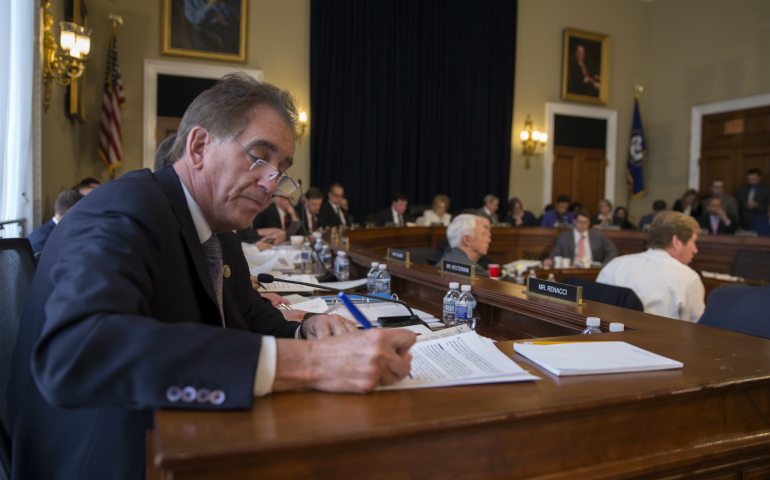
Congressman Jim Renacci, R-Ohio, takes notes as he listens to House Budget Committee lawmakers deliver statements on the American Health Care Act during a March 16 hearing on Capitol Hill in Washington. (CNS photo/Shawn Thew, EPA)
The Democrats displayed discipline during the Republican effort to repeal and replace Obamacare. Not only did no Democrat vote for the repeal, but they exercised discipline in their messaging on the issue. I was a bit surprised because usually the Democrats are dreadful at delivering their core messages.
In fact, the Democrats did a better job defending Obamacare this year than they did when the bill was first passed. I remember speaking to someone who worked at the Department of Health and Human Services the day after President Barack Obama signed the Patient Protection and Affordable Care Act (ACA). I told her, "Remember, selling this thing has only begun." Unfortunately, the Democrats did not listen. They followed Obama's mantra "good policy is good politics," which is true but only in the long term.
During the 2010 midterm election, the pollsters told Democratic candidates that the ACA was unpopular and they should speak about other issues. They were wiped out at the polls, and the ACA only grew more unpopular. Why? Because the only people talking about it were the Republicans, and they were trashing it.
This is one of my principal difficulties with the Democratic Party in its current iteration. They and their candidates are surrounded by a network of campaign consultants — television and advertising teams, pollsters, direct mail experts, professional fundraisers — who let the polls drive the message instead of the other way round. Twelve years ago, journalist Amy Sullivan described the culture of consultancy that has hobbled the Democrats, and her words still ring true. Democrats forget that politicians can drive the polls if they have a clear message that corresponds not to what the pollster tells them but to what the people they know tell them: real people, with real stories, stories you can share, to create a narrative, which frames the issues.
In the debate about repealing and replacing the ACA, every time I heard a Democrat on cable TV or the radio, they found a way to deliver the same core message: Health care is a right, not a commodity. That is the kind of core messaging or framing of an issue that is really important because the policy particulars are always discussed within a particular frame. Everything that is wrong with our health care system is in some way related to the fact that while markets are very good at determining what goods to produce and at what price and in what quantity, markets are not great at allocating health care needs or costs. Health care is not a refrigerator. You can put off getting a new refrigerator until it fits in your budget. When you have a heart attack, you need medical attention now. And it shouldn't matter whether you are rich or poor: When you need medical help, it should be there.
As I discussed yesterday, President Donald Trump and congressional Republicans have indicated that they intend next to address the issue of tax reform. Democrats must again exercise message discipline. Their message should be simple: Just as it is wise to fish when and where the fish are biting, the tax code should go where the money is. In the past several decades, the economic rewards have not been distributed widely among the people of this country. The increases in income and wealth have gone disproportionately to the richest of the rich. They benefit the most from the entire economic system and so they should pay the most to keep that system going.
We know that Republicans warn that increased taxes will diminish the incentives rich people have to invest. Hogwash. Unless there was a 100 percent tax, you always have an incentive to make more money. And while some companies could, conceivably, move their business overseas to other countries with lower taxes, most economic activity in this country can't be moved. The restaurant industry can't be moved because you can't go to lunch in Bahrain. The hotel industry exists everywhere, but some people will always prefer Disney World to Denmark. Construction occurs all over the world, but you can't build a new airport for Omaha from Bolivia nor improve the metro system in Washington by hiring a construction company in Kenya. Manufacturing is an issue, one that must be addressed, primarily through better trade agreements. The financial industry is the most portable, but I have a hard time thinking it will decamp from Wall Street entirely, and if it did, would we mourn?
Democrats should quote again and again what Pope Francis said about trickle-down economics: "Some people continue to defend trickle-down theories which assume that economic growth, encouraged by a free market, will inevitably succeed in bringing about greater justice and inclusiveness in the world. This opinion, which has never been confirmed by the facts, expresses a crude and naive trust in the goodness of those wielding economic power and in the sacralized workings of the prevailing economic system." Okay. Maybe Democratic candidates should not employ the verb "sacralized." Invoke the biblical imagery of the golden calf! And they should follow up with the point that most of us lack the power to stand up to those "wielding economic power" and need to the government to step and in do that for us.
Us. It is the key word in that sentence. We do not want government, under Democratic or Republican control, using its power to reward friends. We want government to serve the common good. This is Catholic social doctrine 101. But, it is also the history of the progressive movement in this country. When I began this blog many years back, I said that one of the guiding stars of my thinking about politics was found in Arthur Schlesinger Jr.'s The Age of Jackson. Schlesinger wrote:
American democracy has come to accept the struggle among competing groups for the control of the state as a positive virtue – indeed, as the only foundation for liberty. The business community has been ordinarily the most powerful of these groups, and liberalism in America has been ordinarily the movement on the part of the other sections of society to restrain the power of the business community.
President Trump may think of Jackson as an inspiration, and our seventh president is viewed warily on the left because of his views and actions regarding slavery and Native Americans, which were abhorrent, even by the grim standards of his day. Nonetheless, Jefferson and Jackson and the two Roosevelts embodied this core meaning of progressivism that Democrats must recapture and make their own.
Democrats don't hate business. They recognize that business leaves important social needs unaddressed. They recognize that individual businesses can serve the common good, but we will always need government to articulate those shared goods that constitute the common good and to pursue the ones for which the business community, and the market economy, are ill-suited or uninterested. And business and the wealthy benefit the most from all that we the people undertake together.
This is the message, the frame, Democrats need to stick to: Tax reform should raise the revenue the common good requires, and we should get the bulk of that revenue from those who benefit most from the common country and economy we share. Yes, make the tax code simpler. But they must stand together to resist anything that will make the tax code more regressive than our economy already is.
[Michael Sean Winters is NCR Washington columnist and a visiting fellow at The Catholic University of America's Institute for Policy Research and Catholic Studies.]








